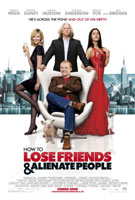For those of us attempting to eke out a living using the power of the written word, there are only two ways to go: keep your integrity and resign yourself to a life of righteous poverty or, conversely, be a successful hack with a fancy watch. It isn’t easy being a writer, but at least it’s a decent jumping off point for comedy. It’s been used over and over again in movies, the idea of serious journalists bitterly entrenched in the aggressively shallow world of the high power magazine. It’s used again in How to Lose Friends and Alienate People, only this time with a British accent.
Simon Pegg plays Sidney Young, a celebrity journalist who makes a moderate living sneaking into swanky parties and talking shit about the celebrities who populate them. He thinks of himself as a type of populist hero, a sort of British Jimmy Stewart who speaks truth to power without fear of repercussion. His cheeky magazine, the Post-Modern Post, is run out of his apartment, above a kebab shop.
Despite being humiliatingly kicked out of a post-awards show party he crashed with the help of a pet pig, Sidney impresses New York editor Clayton Harding (Jeff Bridges) enough with his audacity to land a job at Sharp's magazine (clearly a clone of everyone’s favorite rag for the rich Vanity Fair). It is here Sidney will learn that in the world of celebrity journalism, only the ultimate ass-kisser survives.
He starts off on the wrong foot entirely: Sidney shows up to the first day of work in a red t-shirt with “Young, Dumb, & Full of Come” printed on the front in huge block letters. Not surprisingly he makes few friends at Sharp’s, which is populated with the type of proud-to-be-dumb tools who unfortunately rule the publishing world. He does manage to charm Allison (a disappointingly wan Kirsten Dunst), a sometimes novelist who has ambitions beyond captioning photos from the latest hot rooftop party, but Sidney is too distracted by his interest in foxy ingénue Sophie Maes (Megan Fox) to recognize Allison’s budding attraction to him.
After having his insubordinate story pitches repeatedly shot down by Clayton, Sidney begins acting out with a series of sometimes funny, but mostly stupid pranks. My personal favorite is when Sidney, attending a Fourth of July party at a Hamptons McMansion, climbs aboard the stage alongside a soft jazz band and starts shouting soccer chants, entreating an off-screen Orlando Bloom to join in because “you used to be English!” It's the only truly hilarious moment in the entire film.
When Sidney finally gives up on being subversive and learns to play the game, shamed into submission by powerful publicist Eleanor Johnson (Gillian Anderson), the rewards are numerous: a huge watch, a Park Avenue apartment, a close relationship with Sophie, and a prominent byline in Sharp’s. But there it is, once again, the eternal question: is it worth it? You can probably see where all of this is going and if you’ve watched The Devil Wears Prada, you already have seen it.
Pegg has a face well suited to comedy and he uses it to great effect, twisting into looks of despair, agony, and disgust at a moment’s notice (and he has ample occasion to express those emotions), even though he hasn’t really brought anything new to the character of Sidney. He’s made a career out of playing a booze loving, pop culture literate Brit with an old school turntable and a moderately impressive record collection, and so it is here. Despite the familiarity of his character, it’s hard not to root for Pegg, even when the material he’s given to work becomes as thin as the “rexy” fashion editors in the film.
Your Daily Blend of Entertainment News
Though narratively speaking, How To Lose Friendsis generally well put together, there are a few loose ends here and there. A subplot involving Allison’s romantic involvement with lecherous editor Lawrence Maddox (Danny Huston) is set up quickly and resolved with even more speed. Sidney has a strained relationship with his father, a famous philosopher, but this, too, is set up quickly and then abandoned after a scene or two. The whole ending of the film seems rushed, as if director Robert B. Weide realized that he was so close to the finish line, he might as well hurtle over it. It’s unsatisfying more than anything else.
Perhaps this middling film might play better in England, where audiences can pick up on cultural cues invisible to us dumb Yanks. But for those of us here Stateside, it’s hard to buy the conceit that the little guy in the big city will triumph with integrity. We know better. Out here in the real world, intelligence and wit are no match for towering stupidity and ridiculous arrogance. It’s a point which How to Lose Friends and Alienate People proves all too well.

